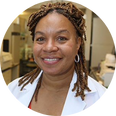Faces of FASEB
Industry Scientist Finds Acceptance: It's Okay to Be Different
 As a teenager in Fort Worth, Texas, Cherié Butts was a math whiz whose test scores qualified her for a post-baccalaureate program. And she was a high school cheerleader. That is, she had everything—including a self-suffocating need to fit in.
As a teenager in Fort Worth, Texas, Cherié Butts was a math whiz whose test scores qualified her for a post-baccalaureate program. And she was a high school cheerleader. That is, she had everything—including a self-suffocating need to fit in.
She did everything she could to avoid standing out as super-smart.
Her journey began at age 4, when her mother sent her off to kindergarten. When Butts reached middle school, the city introduced the post-bac program in six disciplines, including health professions and engineering. She qualified, and at age 11, she says:
“I had to make a decision before I really understood what decision I was making.”
Having already won numerous citywide scholastic contests and a Summer at Purdue University to study biochemistry, she chose engineering since it fueled her love for puzzles and figuring out how things work. She stood out again: one among just a few girls.
“And that bothered me. I said, ‘Look, I already suffer from being the only Black person, in many cases, I don’t want to be the only girl, too, so I immediately rejected engineering,” she says. “The whole idea of being the only girl drove me crazy.”
There was another concern: how does she fit into society. “In Texas, girls are not supposed to be smart. They can be outspoken, but they’re not supposed to be smart,” she says. “And that why my teachers recognized that I was trying to fail.”
Her father had a different view and told her: “‘You are smart. There's nothing wrong with it. Stop dumbing it down so you can be like everybody else.’”
Friends told her the same thing.
“My trajectory was based on my friends because I didn't want to stick out. They would sit me down and say, ‘People need to know that you exist.’”
She went on to earn her doctorate at the University of Texas MD Anderson Cancer Center. After a stint in government, she moved to industry, where she is medical director and head of clinical assessments of digital and quantitative medicine at Biogen, a multinational biotech firm based in Cambridge, Massachusetts.
She did a postdoctoral fellowship at the NIH and worked at the FDA, where she became again drug/biologics application reviewer, according to her LinkedIn account, which also shows her ziplining in Costa Rica from 80-stories up.
In December 2020, the European Medicines Agency, the equivalent of the U.S. FDA, approved a drug she had been working on since 2018 for treatment of relapsing forms of multiple sclerosis: Biogen’s Plegridy. In January of 2021, the FDA also approved this interferon treatment.
Today, she has embraced her unique talents … and her unique position. In other words, the girl who worked to minimize her strengths is working to elevate underrepresented communities about COVID-19, to address concerns and misinformation about the vaccine.
“I'm on the other side of that thinking,” she says, her relentless, infectious laughter a clue to her self-conscious humility. “I now put on a cape, and I say, ‘You know what? I am in a unique position. I need to do what I can to help everybody else.”
Cherié Butts currently serves as Treasurer on the FASEB Board.